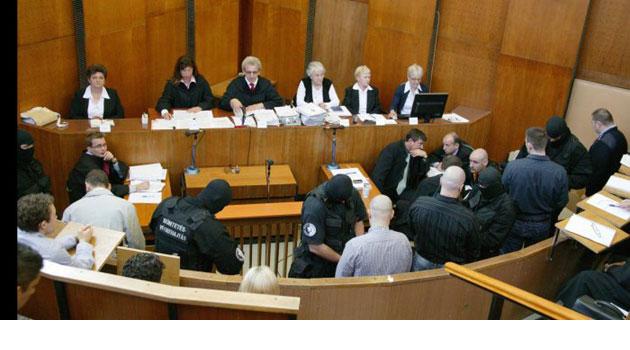Hungary: Appeals verdict expected in case of murder spree against Romani people

Tomorrow, Wednesday 15 April, the second round of a court proceedings in the matter of a murder spree perpetrated against Romani people in 2008 and 2009 will begin at the Municipal Appeals Court in the Hungarian capital of Budapest. It is presumed that the second-instance court’s verdict will be announced in May.
The trial has undergone significant delays because the judge at the first-instance court did not manage to write up his verdict within the legally-required time frame of 60 days, which meant a disciplinary proceedings was begun against him. The judge did not send his verdict to those involved in the proceedings until one year after it was announced, and Hungarian media report that the printed version of the verdict is more than 900 pages long.
On 6 August 2013 the first-instance court sentenced Árpád Kiss, his brother István, and Petö Zsolt to life in prison. A fourth defendant, István Csontos, who drove the group’s getaway car, was sentenced to 13 years in prison for never attempting to prevent them from committing their crimes.
The first-instance court said the defendants were found guilty of participating in the attempted murders and murders of several people for particularly heinous reasons, i.e., racial motivation, which is not recognized by the Hungarian Criminal Code as an aggravating circumstance. The court proved that the defendants planned and executed a total of nine attacks in a particularly heinous manner.
Six people died as a result of this crime spree, including a small child, while another five were seriously injured. The assailants threw a total of 11 Molotov cocktails and shot 78 rounds of ammunition, including at people who were fleeing burning buildings, exposing a total of 55 people to possible harm.
During their assaults the perpetrators used building plans with sketches of possible exit routes, maps, night-vision goggles and walkie-talkies. During one nighttime attack on a single-family home in the northern town of Kisléta, for example, they shot a mother to death in her sleep and seriously wounded her daughter.
Hungarian authorities keep information about suspect secret
The Hungarian Defense Ministry previously announced that during the investigation, the Military Security Office (Katonai Biztonsági Hivatalnál – KBH) committed serious violations of Hungarian law. It has been determined that the former Director-General and the former Deputy Director of the KBH committed serious ethical and professional misconduct by failing to reveal to investigators and the relevant committees of Parliament that defendant István Csontos had previously been a secret associate of the KBH.
The Central Military Prosecutor’s Office initiated criminal proceedings in this matter against four officials on suspicion of felony forgery of public documents. It was also proven that another defendant, István Kiss, had long been on the radar of the National Security Agency because of his extremist activities prior to his arrest in 2011.
However, their surveillance of him was not expanded to include an investigation of the time during which the murder spree had taken place, even though that would have been legally possible. During the trial it also came to light that other people had contributed to the crimes as drivers of getaway cars; after the first-instance verdict was handed down the state prosecutor initiated prosecutions of those other suspects.
International parallels
The Hungarian case has several parallels with a series of murders committed by neo-Nazis against people of color from 2000-2007 in Germany which has been on trial in the Bavarian city of Munich for two years now. In that case as well, several members of the German secret services failed to inform investigators of serious facts in relation to the National Socialist Underground (NSU) group, which perpetrated the attacks.
Detectives, therefore, based their investigations on the theory that the murder spree did not involve extremists. Similarly, in the Czech Republic the secret services and the anti-extremist department of the Moravian-Silesian Regional Police ignored, for several years, a series of arson attacks on Romani families’ dwellings during 2007-2009 that ultimately resulted in the Vítkov arson attack.
One victim of that attack, an infant named Natálka, survived serious burns and will suffer the consequences of that crime for the rest of her life. In all of these cases, the perpetrators acted in accordance with the manual of the international neo-Nazi organization Blood & Honour.
After committing their assaults, the perpetrators never sent any communications to the media informing them of their political demands. They carried out the attacks professionally and carefully kept their identities secret.
Hungarian victims spent years without state aid
In 2013 the Hungarian Romani civil rights activist and politician Aladár Horváth told the following to the German weekly Der Spiegel: "Those murders were crimes against humanity, but they did not disturb Hungarian society in the least. No one has ever apologized on behalf of the political elites or the state to the victims or their relatives, no one has taken responsibility – not legally, not politically, not symbolically. None of the victims has received adequate financial assistance."
It was not until five years after the last attack that the Government of Viktor Orbán paid the victims symbolic compensation of several thousand euro each in order to improve their living situations. Hungarian director Bedenek Fliegauf has made a feature-length film about the case called "Just the Wind", and director Esther Hajdú made a documentary film about the first-instance trial, "Judgment in Hungary"; both have won several prizes at international film festivals.